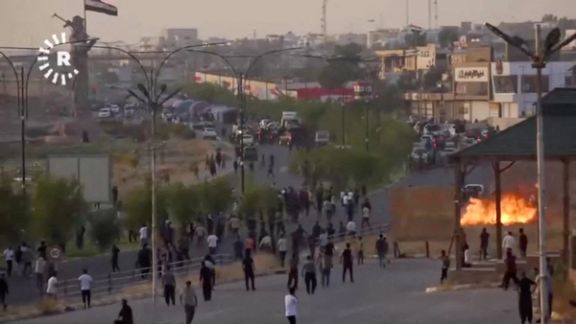Iran Plays A Role In Arab-Kurdish Conflicts Emerging In Iraq And Syria

Ethnic tensions between Kurds and Arabs are simmering in Syria and Iraq with reports that Iran is sowing further discord to weaken dissident Kurdish forces.

Ethnic tensions between Kurds and Arabs are simmering in Syria and Iraq with reports that Iran is sowing further discord to weaken dissident Kurdish forces.
AN uprising by Arab tribes against the Kurds is reportedly backed by Tehran proxy militias as well as Turkish forces, targeting different Kurdish groups across the region, with oil-rich provinces of Deir ez-Zor (Deir al Zor) in Syria and Kirkuk in Iraq as hotbeds of clashes.
Iran’s Foreign Minister Hossein Amir-Abdollahian met with his Turkish counterpart, Hakan Fidan, in Tehran, where they stressed the need for further security cooperation.
During their joint presser, Fidan called on Syria’s government to bolster cooperation against the PKK, emphasizing that the group is designated a terrorist outfit by the US and Europe as well as Turkey.
Amir-Abdollahian, in his turn, said the sovereignty and territorial integrity of nations should be respected, calling for collaborations among Tehran, Ankara, and Damascus regarding issues related to terrorism and border security. Without going into details, he praised Fidan’s “constructive ideas regarding the common borders and counterterrorism efforts.”
US-based journalist Diliman Abdulkader said Kurds are targeted on all fronts this week, with bombing in Iraqi Kurdistan’s Erbil, bloody protests in Kirkuk and rise of the Arab tribes in Kurdish-controlled northern Syria.
On Sunday, Reuters reported that senior US officials visited Syria's eastern Deir ez-Zor province in an attempt to defuse the uprising by Arab tribes against Kurdish rule that is destabilizing northeast Syria. According to US State Department, Deputy Assistant Secretary of State for Syria Ethan Goldrich and Major General Joel B Vowell, who heads the coalition against Islamic State, met Arab tribal leaders and SDF commanders and agreed to "address local grievances" and "de-escalate violence as soon as possible and avoid casualties."
The Arab tribal backlash against the rule of the Kurdish YPG militia has led to clashes, with over 150 killed and dozens injured in the past several weeks. The militia forms the backbone of the US-backed Syrian Democratic Forces (SDF), and the uprising is the biggest threat to their rule since they drove Islamic State (ISIS) out of a swathe of the country's north and east in 2019.
Foreign policy analyst Walid Phares said on X (formerly known as twitter) that the clashes between the SDF and Arab Sunni tribes in Deir ez-Zor "have been instigated by Iranian intelligence,” claiming that “the Islamic Republic and the Muslim Brotherhood militias are collaborating to weaken and reduce the SDF control in eastern Syria” aimed at "crippling US presence.” According to Phares, Turkish drones are also providing air support to the Muslim Brotherhood militias attacking SDF positions in Northern Syria.
Hussain Abdul-Hussain, a research fellow at the Foundation for Defense of Democracies, said Monday that the Iranian regime is preparing “to subdue US Kurdish allies in Iraqi Kurdistan” as “regime’s pawn in Lebanon Hezbollah is preparing to engage in violence” against US Druze friends in southern Syria.
Several cities in southwestern Syria are also scenes of protests for economic reform and curbing Iran's influence. Protesters, demanding an end to President Bashar al-Assad's authoritarian rule, earlier closed the ruling Baath party headquarters in Sweida, a southwestern Syrian Druze city. Iran intervened in the Syrian civil war as early as 2011 to defeat a rebellion against Assad. Now, having built a large military presence there, Iran is using Syria to expand its regional reach and pose a threat to Israel's northern borders.
The involvement of the pro-Iran militias also has another dimension. Late in August, Iran and Iraq formalized an agreement to dismantle Iranian Kurdish dissident factions stationed in the northern reaches of Iraq and relocate them from their bases. These dissident factions in Iraq have aligned their allegiances with the two principal Iraqi Kurdish parties: the Kurdistan Democratic Party, headquartered in Erbil, and the Patriotic Union of Kurdistan party, with its stronghold in Suleimaniyah.
The arrest of a renegade Arab commander last month by the SDF sparked unrest that soon swept a string of towns from Busayrah to Shuhail, in a strategic oil belt in the heart of Arab tribal territory east of the Euphrates River. Arab tribal fighters initially drove out the Kurdish-led forces from several large towns, but the SDF has begun to regain the upper hand.
The presence of the US military in regions under the control of the SDF has acted as a deterrent against the expansion of militias supported by Russia and Iran, who have established a foothold in territories to the west of the Euphrates River.
SDF has accused Tehran and the Damascus of sending tribal militias to wreak havoc in the northeast of Syria.
Arab tribal leaders say they have been deprived of the oil wealth in their region after the Kurdish-led forces gained control over Syria's largest oil reserves following the departure of the Islamic State. "We want them out of all of Deir ez-Zor, we want the administration of the area in the hands of the original Arab inhabitants," said Sheikh Mahmoud al Jarallah, a tribal leader.